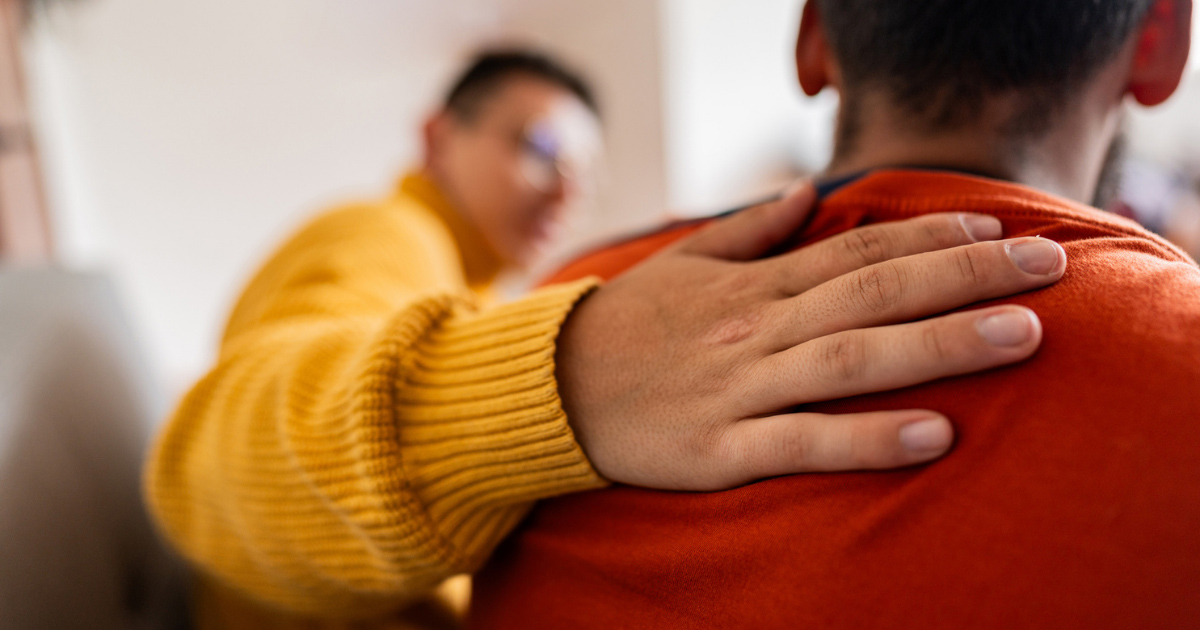If you are reading this, the road you and your family have walked has probably already been a difficult one. When you have a loved one with a substance use disorder (SUD), you’re in a prime position to experience the feelings of fear, anger, and helplessness that can come with watching them struggle, and that can be compounded by feeling unsure of what to do. If you’re like many people, you may even feel shame for both your family member’s condition and your struggle to offer solutions.
I’ve been in the recovery community a long time, both as an individual with SUD and a recovery professional, and it’s not unusual for these issues to be further complicated by a sense of responsibility that family members feel for their loved one’s struggles. So often, family members feel that providing an avenue to sobriety and maintaining recovery falls to them, especially when their loved one continues to struggle. This fosters a pressure that can stunt even the most dedicated recovery advocate’s ability to think clearly and look for solutions, especially when we are already exhausted.
Do not lose hope. Substance use disorder is both very common and deeply personal. Like other health issues, it can spread in a sense, as it affects not just the person afflicted by SUD but also those around them. However, it is through these same connections that change can happen. Sickness thrives in isolation, and although it can impact a family system, healing does too.
Family support for addiction means viewing SUD recovery as a journey taken together rather than separate journeys experienced in isolation, which can make all the difference.
You Are Not Alone, And It’s Not Too Late
The experience of having a loved one struggling with SUD can strain relationships, weaken support systems, and destroy trust. Compounding these strains can be guilt – many wonder whether their actions may have caused or contributed to a loved one’s crisis. These feelings are common, and it’s essential to remember that you’re not alone.
Pew Research (Gramlich, 2017) found that nearly half of all Americans say they have had a friend, family member, or other loved one struggle with SUD. Families in crisis are still families, and those grappling with substance use are still our loved ones. The very underlying bonds that are strained by this experience are an essential key to recovery. With guidance, research, and access to appropriate resources, the family unit can serve as an essential conduit for healing to occur.
One of the most helpful tools that these family members have at their disposal is their varied relationships. Parents, spouses, and siblings all have distinct dynamics and communication styles. When these relationships work in tandem, rather than in isolation, we can help a loved one regain control of their life. For example, while most people who seek rehabilitation do so as self-referrals, meaning they arrive under their own volition, they typically do so with family support and encouragement.
This being said, supporting recovery is no easy task, and it can often feel contradictory as family members navigate their own emotions alongside their desire to support their loved one. It can sometimes feel like water drawn from a well that has been made dry by past disappointments, betrayals, and self-blame. When this happens, it is important to remember the “Three Cs” of recovery: you did not cause your family member’s SUD, you cannot cure it, and you cannot control it.
No one has the power to “fix” someone, but many family members overestimate their role in a person’s recovery. Change can only come from within. However, simply by being there, offering compassion, and encouraging healthy habits, families can be a lifeline. If you’re here reading this, you are already making a positive impact.
What To Do When a Loved One Is Addicted

When a family member is afflicted with SUD, it is natural to experience a shifting range of emotions. You might feel like the ground is giving way one minute, only to be replaced by relative calm the next. It may feel like a family is wrestling with an overwhelming force, and your loved one has been replaced with a stranger at times.
Under extreme pressure, people can often make rash decisions. While this is a natural response to the spectre of SUD, emotional decisions or outbursts can often hurt a situation more than help. And, as I mentioned before, you are not in charge of your loved one’s recovery.
Still, that does not mean there is nothing you can do. There are a few steps you and other family members can take to let your loved one know you’re supportive while caring for yourself, too.
Pause and Breathe
Under stress, humans naturally enter a fight-or-flight response. If you’re confronted with a loved one afflicted with substance use, before rushing into a responsive action, take a moment to slow down. Crisis narrows your vision, especially when you are in the initial stages of grappling with something as shapeless and scary as a loved one’s substance use disorder.
It is good to get space to see options clearly. Try to find equilibrium by making room for yourself to think. It is only then that you can become more objective. Remember, if you are not taking care of yourself, you won’t be of use to another’s healing.
Learn About What You’re Dealing With
Our society often depicts SUD as a moral failing. This misunderstanding can make it more challenging for family members to offer effective support to their loved ones. Understanding substance use disorder as a mental and behavioral health issue rather than a personal attack or a series of poor choices can help shift your approach.
By educating ourselves and learning about individuals with SUD and the recovery process, we open the doors to a deeper understanding. By taking the time to learn about our loved ones’ experiences and the unique challenges they face, we can start working towards healthier conversations and decision-making.
Stop Trying to Fix it Alone
Too often, family members feel that the burden of support falls solely on them. This can stem from feelings of guilt and obligation. Ultimately, however, this is a self-defeating mindset.
Attempting to “fix” your loved one on your own can become reflexively destructive and make someone think the failures of a family member in the throes of substance use are their own. Worse, it further compartmentalizes substance abuse. Setting boundaries for yourself, offering support, and sharing the burden can help you be a more effective resource for your loved one.
There is a reason that intervention specialists, family counselors, and recovery coaches exist. They are there to help, offer guidance, and strategize a road to recovery. They, along with others, provide essential resources necessary for the healing process. You do not need to carry this by yourself.
Be Open to an Intervention
Often, families avoid pursuing addiction intervention help because they are afraid of pushing too hard or losing trust. Interventions, unfortunately, have a reputation for confrontation or attacking an individual; however, while this may be what you see on television, it is not what proper interventions are truly about. Real interventions can take multiple meetings to build trust, prioritize compassion, ensure proper timing, and provide a clear path towards treatment.
Done correctly, an intervention is not a single event, but rather a critical series of steps that help a family member begin their road to recovery. Interventions can help both the family and their loved one face the realities of the situation and communicate openly. In fact, it is often the case that interventions are the first time the individual admits they have a problem.
With understanding and structure, interventions can be a crucial and significant step. According to the Association of Intervention Specialists (Law, 2025), on average, 80% of interventions result in the subject seeking some form of treatment..
Support Each Other
SUD is a disorder that can affect the entire family unit. Under the stress of a substance use disorder, families can break down if they don’t offer each other support. Remember, it is not just your loved one who is suffering – the family system needs healing, too. Make an effort to extend compassion, strength, and encouragement to one another. Families are a vital structure for moving forward with recovery, and keeping them strong is essential.
One of the best ways to support yourself, the rest of the family, and your loved one with SUD is to utilize resources designed to help. Consider attending Al-Anon meetings, consulting with therapists, or engaging with other recovery communities. Don’t be afraid to explore various resources for help – social organizations, civic programs, religious communities, and online resources can all provide education, support, and opportunities to connect with others. Remember, in isolation we fall, but together we can pick each other up.
Hope for Families in Crisis
Control and understanding your relationship with it is a significant factor in how families deal with a loved one’s SUD. Recognizing that a family member has lost control can be difficult and upend family dynamics. Worse, it can create a situation where you might feel the need to attempt to take control of your loved one’s healing.
Someone losing control under the shadow of SUD can sometimes appear as a stranger to even those closest to them. The actions they take can confound, sadden, and frighten those who love them the most. But remember, a person is not defined by their misuse of substances, and the pain it causes does not define a family.
Regardless of how broken things may seem, there is hope for a better future. The recovery process takes time. Remember that while there is no instant answer, working together and giving mutual support is a step in the journey to long-term health.
Now Is the Time to Get Help and Focus on Hope

It is a challenging thing to start down the road to recovery. Even families with the best of intentions and a sense of purpose can feel helpless along the way. Now, when your loved one and your family are in crisis, it is the best time to take that first step. Here’s how:
Reach Out
Since 1995, I have been working in the recovery field, holding various positions that have ranged from consulting to recovery counseling, and working with a diverse range of non-profit organizations. As a person in recovery myself, the greatest blessing in my life has been to assist those suffering from substance use disorders. A very close second is helping families find hope and support on their journey to caring for their loved ones.
There is no cure-all for SUD or family struggles, and the road is not easy. However, with a solid structure of support and professional assistance, change can happen. If you are part of a family struggling with these challenges, I encourage you to start by reaching out for guidance, productive strategies, and other steps you can take to address them.
Explore Further Resources
Remember that while SUD is a personal struggle, it is a path that many have walked. You are not the first family of addicts who have walked the road to recovery, and you won’t be the last – you are not alone. Intervention materials, AA resources, advisory and health services, community groups, and more are built to provide help to individuals and families seeking recovery.
Consider perusing and subscribing to Daily AA Reflections as a valuable support tool for both family members and those suffering from a substance abuse disorder. I’ve also created a list of resources that may be helpful, which includes drug treatment locators, helplines, substance use resource institutions, and much more.
Know That There Is Hope

SUD is not the end of your family’s story, and it doesn’t have to keep clouding your family’s future. Families that work together, offer support structures, seek help, and approach SUD with compassion can be a pillar of strength to your loved one. There is hope, and you’re in a better place than ever to pursue the light rather than remaining in the darkness.
That said, it’s important to remember that you are only one person. When being there for a family member, it’s essential to educate yourself, set boundaries, and recognize that this responsibility does not fall solely on you. For your loved one with SUD, change and willingness to accept help must come from within. However, by taking small steps to educate yourself and explore outside help, you are making important strides to support your loved one.
Reach out today to take the first step in getting the support you need, and we can walk this journey together.
Stay Strong,
Jim
Sources:
- Pew Research Center. (2017, October 26). Nearly half of Americans have a family member or close friend who’s been addicted to drugs. Pew Research Center. https://www.pewresearch.org/short-reads/2017/10/26/nearly-half-of-americans-have-a-family-member-or-close-friend-whos-been-addicted-to-drugs/
- Volkow, N. D., & Li, T. K. (2005). The neuroscience of addiction. Nature Neuroscience, 8(11), 1429–1430. https://doi.org/10.1038/nn1105-1429
(From PubMed Central: https://pmc.ncbi.nlm.nih.gov/articles/PMC3725219/) - Association of Intervention Specialists. (n.d.). Intervention: What is the success rate? Association of Intervention Specialists. https://www.associationofinterventionspecialists.org/intervention-what-is-the-success-rate/




